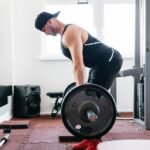14 Proven Tips to Boost Muscle Recovery for Dubai’s Fitness Enthusiasts
As a Dubai-based personal trainer with a sports science degree and 14 years of experience, I’ve guided countless clients through the vibrant fitness scene of the UAE, from bustling Jumeirah gyms to elite training hubs in Dubai Sports City. Whether you’re sweating it out in a high-energy class or lifting weights in a luxury fitness studio, one thing remains clear: muscle recovery is the key to unlocking your performance potential.
No fancy gadget or supplement can outshine the basics—proper nutrition, hydration, and rest.Here, I share 14 science-backed strategies to optimize muscle recovery, tailored for Dubai’s fitness community. These tips, grounded in my expertise and the latest research, will help you train smarter, recover faster, and stay injury-free in this fast-paced city.
How These Tips Are Structured
I’ve organized the strategies into five key areas:
- Nutrition: Fueling your body for repair and growth.
- Hydration: Staying fluid-balanced in Dubai’s heat.
- Supplements: Smart, evidence-based additions to your diet.
- Lifestyle Habits: Daily practices to enhance recovery.
- Habits to Avoid: Pitfalls that can derail your progress.
These tips are flexible—adapt them to your fitness level, goals, and lifestyle. While advanced techniques like cryotherapy might appeal to competitive athletes, most people will see the best results by mastering the fundamentals. Always check with a healthcare professional before making major changes.
Nutrition
Good nutrition is the backbone of recovery, especially in Dubai, where personalized training and wellness are in high demand.
- Post-Workout Protein
When you train, your muscles endure tiny tears that need protein to repair. Studies suggest aiming for 1.6–2.0 g of protein per kg of body weight daily to support muscle growth (Kreider et al., 2017). After a workout, a quick protein shake or a meal like grilled chicken with quinoa—popular in Dubai’s health-focused cafes—delivers the amino acids your muscles crave. - Pre-Workout Protein
Eating protein before training can help you hit your daily protein goals and kickstart recovery. While total daily intake matters more than exact timing (Schoenfeld et al., 2013), a pre-workout snack like Greek yogurt with almonds is perfect for Dubai’s busy professionals rushing to the gym after work. - Post-Workout Carbs
Your muscles store energy as glycogen, which gets depleted during intense exercise. Pairing carbs with protein after a workout replenishes glycogen and aids muscle repair (Burke et al., 2011). Try a post-gym meal of brown rice and salmon, widely available at Dubai’s healthy eateries like The Cycle Bistro. The amount you need depends on your workout intensity and body size. - A Balanced Diet
A nutrient-packed diet prevents deficiencies that slow recovery. In Dubai, where fast food tempts at every corner, prioritize whole foods: fresh fruits and vegetables, lean proteins like lentils or fish, and healthy fats from avocados or olive oil. Visit local spots like Ripe Market for fresh, organic ingredients to keep your diet on track.
Hydration
Dubai’s scorching climate makes hydration non-negotiable for recovery and performance.
- Stay Hydrated
Dehydration can stall muscle repair, especially in the UAE’s heat. The American College of Sports Medicine recommends drinking about 1.5 liters of fluid for every kg of body weight lost during exercise—roughly 3 cups per pound (Sawka et al., 2007). Keep a water bottle handy during sessions at gyms like Fitness First to stay on top of hydration. - Tart Cherry Juice
Tart cherry juice can reduce muscle soreness and inflammation, making it a natural recovery booster. A 2022 review found it effective when consumed before exercise, though more research on dosing is needed (Gao & Chilibeck, 2022). You can find it at health stores like Organic Foods & Café in Dubai.
Supplements
Supplements can enhance a solid diet but aren’t magic bullets. Stick to proven options available in Dubai’s fitness market.
- Creatine Monohydrate
Creatine is a well-studied supplement that boosts strength and reduces muscle damage when paired with resistance training (Rawson & Volek, 2003). A daily 3–5 g dose, available at GNC stores across Dubai, is a reliable choice for gym regulars. - Protein Powder
Protein powders—whey, soy, or casein—offer a convenient way to hit your protein targets, especially for those training at boutique studios like Crank. They provide essential amino acids for muscle repair, making them a staple for Dubai’s fitness crowd (Morton et al., 2018).
Lifestyle Habits
Your daily habits shape your recovery, especially in Dubai’s high-energy lifestyle.
- Get Enough Sleep
Sleep is when your muscles rebuild, with hormones like growth hormone peaking to support repair. Intense exercisers may need 8–10 hours nightly (Dattilo et al., 2011). Despite Dubai’s lively nightlife, commit to a consistent sleep routine to maximize recovery. - Try Massage
A good massage can ease muscle soreness and boost flexibility. Research shows it helps with delayed onset muscle soreness (DOMS) (Dupuy et al., 2020). Book a sports massage at one of Dubai’s luxury spas, like those in Jumeirah, for targeted recovery. - Use Compression Gear
Compression garments may improve circulation and speed recovery. A 2019 study found they reduced recovery time in athletes when worn for extended periods (Hill et al., 2019). Pick up brands like Under Armour at Sun & Sand Sports in Dubai for a recovery edge. - Explore Cryotherapy
Cryotherapy—brief exposure to cold temperatures—can reduce post-workout pain and inflammation (Bleakley et al., 2014). Facilities like Cryo Health in Dubai are popular among athletes looking for innovative recovery tools.
Habits to Avoid
Some lifestyle choices can undermine your progress, even in Dubai’s wellness-focused culture.
- Cut Back on Alcohol
Alcohol disrupts sleep, increases inflammation, and may hinder muscle repair (Parr et al., 2014). With Dubai’s vibrant social scene, moderation is crucial to keep your recovery on track. - Steer Clear of Tobacco
Smoking raises the risk of muscle and joint injuries, slowing recovery (Noble et al., 2009). In a city that champions health, avoiding tobacco is a no-brainer for fitness enthusiasts.
How Long Does Recovery Take?
Recovery time depends on your workout’s intensity and your fitness level. Light sessions may need just 24 hours, while heavy workouts could take 2–3 days. Sleep, nutrition, and stress—common in Dubai’s fast-paced environment—also influence recovery speed.
Avoiding Injury During Recovery
To prevent injuries, progress gradually. Slowly increase workout volume or intensity to avoid overtraining. Alternate muscle groups—like legs one day, upper body the next—to give muscles time to recover. This approach is vital in Dubai, where high-intensity classes dominate fitness schedules.
Risks of Poor Recovery
Skipping recovery raises your injury risk, from minor strains to serious muscle tears. Repeated stress without rest causes micro-tears to build up, potentially leading to strains or worse (Meeusen et al., 2013). Prioritizing recovery is essential for everyone, from casual gym-goers to Dubai’s competitive athletes.
Optimizing recovery for muscle growth? Explore how to train every muscle group in our Ultimate Guide to Muscle Groups.
Final Thoughts
Whether you’re hitting the weights at a Dubai gym or joining a fitness challenge in the desert, recovery is your secret weapon for better performance and fewer injuries. As a seasoned trainer with a sports science background, I’ve seen firsthand how a focus on nutrition, hydration, and rest transforms results. These 14 tips, crafted for Dubai’s fitness enthusiasts, blend science with practical advice to help you thrive in the UAE’s dynamic fitness scene.For a tailored recovery plan, connect with a certified trainer or nutritionist in Dubai to match these strategies to your unique goals.
References
- Schoenfeld, B. J., Aragon, A. A., & Krieger, J. W. (2013). The effect of protein timing on muscle strength and hypertrophy: A meta-analysis. Journal of the International Society of Sports Nutrition, 10(1), 53.
- Burke, L. M., Hawley, J. A., Wong, S. H., & Jeukendrup, A. E. (2011). Carbohydrates for training and competition. Journal of Sports Sciences, 29(sup1), S17-S27.
- Dattilo, M., Antunes, H. K. M., Medeiros, A., Mônico-Neto, M., Souza, H. S., Tufik, S., & de Mello, M. T. (2011). Sleep and muscle recovery: Endocrinological and molecular basis for a new and promising hypothesis. Medical Hypotheses, 77(2), 220-222.
- Dupuy, O., Douzi, W., Theurot, D., Bosquet, L., & Dugué, B. (2020). An evidence-based approach for choosing post-exercise recovery techniques to reduce markers of muscle damage, soreness, and fatigue. Frontiers in Physiology, 11, 403.
- Gao, R., & Chilibeck, P. D. (2022). Nutritional interventions for exercise-induced muscle damage and oxidative stress. Nutrients, 14(7), 1408.
- Hill, J., Howatson, G., van Someren, K., Gaze, D., Legg, H., Lineham, J., & Pedlar, C. (2019). The effects of compression garment pressure on recovery from strenuous exercise. International Journal of Sports Physiology and Performance, 14(8), 1078-1084.
- Kreider, R. B., Kalman, D. S., Antonio, J., Ziegenfuss, T. N., Wildman, R., Collins, R., … & Lopez, H. L. (2017). International Society of Sports Nutrition position stand: Safety and efficacy of creatine supplementation in exercise, sport, and medicine. Journal of the International Society of Sports Nutrition, 14, 18.
- Meeusen, R., Duclos, M., Foster, C., Fry, A., Gleeson, M., Nieman, D., … & Urhausen, A. (2013). Prevention, diagnosis, and treatment of the overtraining syndrome: Joint consensus statement of the European College of Sport Science and the American College of Sports Medicine. Medicine & Science in Sports & Exercise, 45(1), 186-205.
- Morton, R. W., Murphy, K. T., McKellar, S. R., Schoenfeld, B. J., Henselmans, M., Helms, E., … & Phillips, S. M. (2018). A systematic review, meta-analysis and meta-regression of the effect of protein supplementation on resistance training-induced gains in muscle mass and strength in healthy adults. British Journal of Sports Medicine, 52(6), 376-384.
- Noble, B. J., & Robertson, R. J. (2009). Smoking and athletic performance. Sports Medicine, 27(6), 355-365.
- Parr, E. B., Camera, D. M., Areta, J. L., Burke, L. M., Phillips, S. M., Hawley, J. A., & Coffey, V. G. (2014). Alcohol ingestion impairs maximal post-exercise rates of myofibrillar protein synthesis following a single bout of concurrent training. PloS One, 9(2), e88384.
- Rawson, E. S., & Volek, J. S. (2003). Effects of creatine supplementation and resistance training on muscle strength and weightlifting performance. Journal of Strength and Conditioning Research, 17(4), 822-831.
- Sawka, M. N., Burke, L. M., Eichner, E. R., Maughan, R. J., Montain, S. J., & Stachenfeld, N. S. (2007). American College of Sports Medicine position stand: Exercise and fluid replacement. Medicine & Science in Sports & Exercise, 39(2), 377-390.








